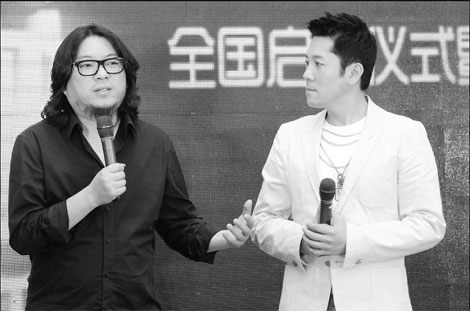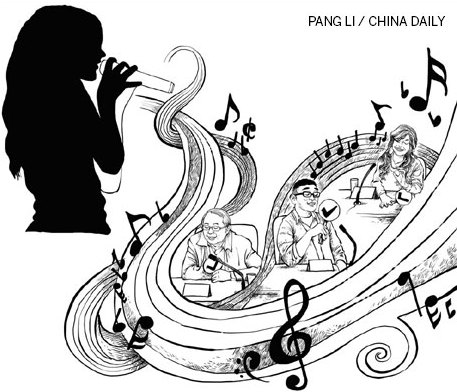 |
|
Composer and songwriter Gao Xiaosong (left) and singer Cai Guoqing attend the launch ceremony of Guangxi Satellite TV's program Sound of Love. Both have been invited to serve as judges in the show's final round. Jiang Dong / China Daily |

A new format for TV singing competitions forbids judges from viewing contestants, ensuring assessments are based solely
on singers' skills. Sun Li reports in Beijing.
New programs are offering twists on singing competition reality shows - blind auditions are ensuring judges' decisions are based on vocal skills alone. Guangxi Satellite TV recently launched Sound of Love, a folk program based on the concept of selecting the singer with the best voice, regardless of appearance and style.
Liu Xichen, president of Shixi Media - the country's leading TV content provider, which produced the show - says it's adapted from True Talent, a singing competition program created by Paris-headquartered Zodiak Media.
"A new folk singing show is high on Guangxi Satellite TV's agenda," Liu says.
"The broadcaster hopes to use the project to promote the Guangxi Zhuang autonomous region's annual Nanning International Folk Song Art Festival. It also wants to borrow the packaging of an already-successful foreign program," Liu continues.
"That's why we bought Zodiak's entertainment format. It's high-ratings, and its concept of focusing solely on voices is fresh in China."
Initial auditions are under way in six cities, including Liaoning's provincial capital Shenyang and Shaanxi's provincial capital Xi'an. Applicants must be at least age 18.
In this phase, three judges - all professional musicians - will turn their backs to listen to contestants.
If they like a contender's voice, the judges will turn around and face the singer. If even one judge doesn't turn around, the contestant is out.
Fifty applicants will advance to the next round, which will air on satellite TV in July.
Viewers will get the final say. Judges - they include composer and songwriter Gao Xiaosong and singer Cai Guoqing - are more like mentors, who offer guidance to competitors.
"Although we've replicated most aspects of the original show, we've altered the stage design," Liu says.
In the second phase, the audience will be divided onstage into three sections, with 100 people from three generations in every section, with their backs to the singers.
If more than 60 percent of the audience votes for a vocalist, their section of the stage swivels around to face the singer. The competitor can continue if all three sections turn around to face him (her).
"The stage is larger and more flexible," Liu says.
Such rules identify a singer who can cater to different age groups' tastes, he says.
The winner will be recruited by a music executive and get the chance to perform at the opening ceremony of this year's Nanning International Folk Song Art Festival.
The concept is also used by Yunnan Satellite TV's recently launched Perfect Voice.
It hopes to capitalize on the novelty and fairness of judging contestants solely on their singing.
The show's director Peng Ying insists the format wasn't inspired by foreign shows but, rather, developed out of a quest for impartiality.
Judges are often influenced by contestants' appearances and style, Peng says.
It triggers controversy when a singer with exceptional looks and an ordinary voice gets higher scores than a more ordinary-looking competitor with an exceptional voice, she explains.
Peng also says the format heeds the ban issued by the State Administration of Radio, Film and Television (SARFT) on "low-brow" and "tasteless" singing competitions.
The show will organize preliminary selections in such cities as Zhejiang province's capital Hangzhou and Guangdong province's capital Guangzhou.
The only requirement is that applicants are at least 18 years old.
Only the preliminary selections will be undertaken by blind auditions. Juries of professional vocalists and music producers will listen to contestants from a private room above the stage in which they can hear but not see the singers.
But they can see live audiences and evaluate their reactions.
The preliminary rounds will select 50 contestants. Judges can see them during subsequent rounds, as they've already proven their vocal qualities, Peng says.
The winner can sign with a leading record company and receive professional training in Singapore and Japan.
Song Ke, a music producer and former CEO of Beijing-based record company Taihe Rye, says blind auditions can be challenging to judges because they only use their ears for hours on end.
"But many judges made off-pitch decisions when it comes to singing competition reality shows," Song says.
"So, we must adopt the blind approach to find the purest voices."



